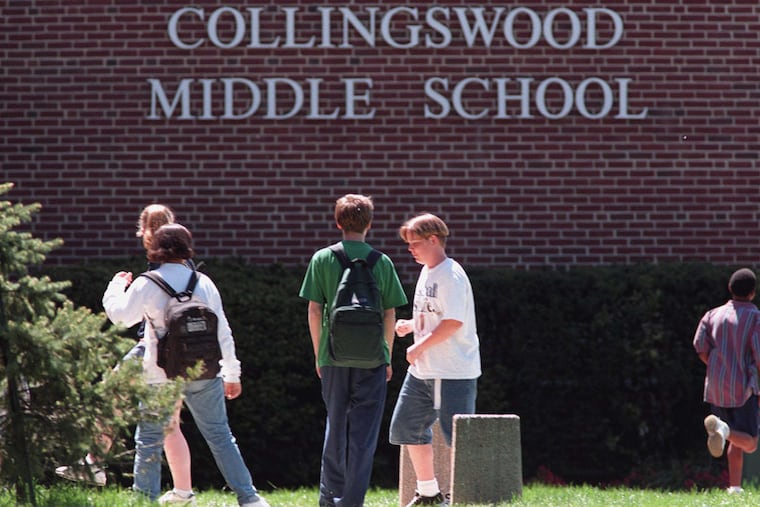South Jersey school district reaches $950,000 settlement with family of girl lured and attacked by cyber predator
Family of South Jersey girl who was sexually assaulted by cyber predator who lured her through her school issued-laptop reaches $950K settlement with school district.

The family of a South Jersey middle-school student that alleged she used a school-issued laptop without proper supervision and developed a friendship with an internet predator has reached a nearly $1 million settlement with the school district.
The Collingswood Public School District agreed to the settlement with the student and her family stemming from a March 2018 kidnapping and sexual assault by Liam Heim, then 23, of St. Petersburg, Fla.
Under the agreement approved in November by Superior Court Judge Yolanda Rodriguez, the victim will receive $650,000 in structured payments. Her parents will get $300,000. The Collingswood school board approved the payments in August.
School Superintendent Scott Oswald declined to comment. Board solicitor Richard Goldstein did not respond to a message seeking comment.
The incident, which happened pre-COVID-19, raises computer safety questions as millions of students across the region and country log online daily for remote instruction, spending hours on devices.
The FBI in Philadelphia said it has seen a rise in attempts by cyber predators to target children since the pandemic. Experts say parents should closely monitor what their children are doing online and immediately report any concerns to school officials.
“These individuals are well aware that kids are spending more time on their devices and computers right now and see it as a target-rich environment to exploit,” Don Asper, supervisor of FBI Philadelphia’s Crimes Against Children and Human Trafficking Task Force, said Wednesday. “Unfortunately, the ease of communication across the internet allows predators to proliferate.”
In 2019, the National Center for Missing and Exploited Children’s CyberTipline received more than 16.9 million reports, including allegations of online enticement and child sexual molestation.
Federal authorities said Heim was living in Florida when he met the 12-year-old victim through an online forum. He convinced her that the two were in a romantic relationship, authorities said.
Heim flew to New Jersey in March 2018, picked up the girl, and took her to a hotel in Philadelphia near the airport, authorities said. A kidnapping alert was issued.
The victim was repeatedly sexually assaulted during a 36-hour period before she was located. Heim was arrested and charged with offenses including traveling in interstate commerce to engage in illicit sexual conduct with a minor.
He later pleaded guilty to child exploitation offenses and was sentenced in September 2019 to 15 years in prison and lifetime supervised release.
The family filed a civil lawsuit shortly after Heim’s guilty plea, alleging that the district failed to heed their requests to limit their daughter’s laptop use. The laptop lacked controls to prevent students from accessing inappropriate websites or communicating with third parties, the lawsuit alleged.
According to the lawsuit, the girl, then a seventh grader, met Heim around February 2018 using the school laptop through a chat room he created called the Doke Literature Club. It included a search engine known as Discord which middle-schoolers could access.
Around that time, the victim’s parents asked the district to block their daughter’s access to any websites unrelated to schoolwork, but the district did not respond, the lawsuit alleged. They became “increasingly concerned” about her laptop and told the school they did not want her to bring it home, the lawsuit said.
The lawsuit also alleged that a school guidance counselor was made aware of the girl’s improper contact with Heim, but never informed the girl’s parents, school officials, or authorities.
The parents eventually reached an agreement with the school that the girl would check the laptop out each morning and return it at the end of the day, the lawsuit said. Heim, however, continued to contact the girl through the school laptop and eventually made plans to meet her at a Collingswood park in March 2018.
In his lawsuit, Cherry Hill lawyer John A. Zohlman said the parents’ expectation was that their daughter “would have no Internet access except during school hours and solely for school purposes.”
The family had not provided the girl with a smartphone or laptop at home, according to the lawsuit. Her only internet access was through the school’s device, the lawsuit said.
Zohlman did not respond to a call seeking comment. The settlement includes about $285,000 in legal fees for lawyers.
Attempts to reach the parents were unsuccessful.
The district made no admission of wrongdoing in the settlement. The district enrolls about 2,100 students in K-12.
Doug Levin, of the K-12 Cybersecurity Resource Center, a website that tracks school cyber incidents, said more steps are needed to protect students from online trolls.
“There’s no question that the security that is really needed to protect students in these circumstances isn’t what it needs to be,” said Levin, president of EdTech Strategies, which runs the cyber security site.
The settlement was first reported last week by John Paff, a frequent public records requester who blogs about government cases. Paff scours court records in search of settlements involving public entities.